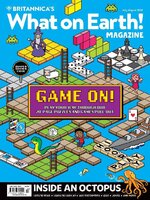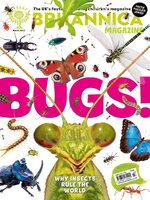What on Earth! Magazine, published in partnership with Encyclopaedia Britannica, is the UK’s fastest-growing children’s magazine, helping curious kids fall in love with reading, knowledge and learning. Covering all their favourite topics – from space, animals and the natural world, to history, machines and inventions – each issue is bursting with amazing facts, photos, quizzes, puzzles, jokes and more!
FACTOPIA! • Follow the trail of crazily connected facts all the way from colourful chameleons to… a hand of bananas!
SNAP IT! • Astonishing photos from around the world
Eureka! • The latest astonishing discoveries, inventions and scientific breakthroughs.
LISTIFIED! • Prepare to be amazed (and amused!) by the unusual facts crammed into these irresistible lists.
SPY GAMES • YOUR MISSION: READ THIS SPECIAL REPORT TO FIND OUT WHAT IT TAKES TO BECOME A SECRET AGENT
5 FAMOUS REAL-LIFE SPIES
SECRET SPY CODES AND TECHNOLOGY
SPY GADGETS
HOW TO BECOME A SPY
INSIDE A TORNADO! • Tornadoes, which are also known as twisters, spin down from giant thunderclouds. Roaring like a train, they rip across the landscape at speeds of between 48 and 113 kilometres per hour (km/h), tearing down buildings, uprooting trees, and hurling cars in the air. Winds spiral around a tornado at 1O5–482 km/h or more, creating a centre of low pressure that can suck up objects like a vacuum cleaner does…
Giant timeline of British history! • To celebrate King Charles III's coronation, we travel back in time to relive some of the most exciting and important moments in British history.
The BIG Britannica Family Quiz • Test your family's brainpower by playing this special four-page edition of the Big Britannica Quiz! Regular readers of Britannica Magazine may have an advantage because some of the facts appeared in previous issues of the magazine. Don't worry if you don't know them all, though – the answers are at the end of the quiz. Good luck!
IS THERE ALIEN LIFE? • For thousands of years, people on Earth believed our planet was special because they thought it was the only planet with life. Over the past few decades, however, scientists have made lots of discoveries that suggest Earth may not be as unique as we thought. Even so, it's still our special home.
Absolutely Everything! • Each month we feature an amazing story from history taken from the bestselling book by Christopher Lloyd, with illustrations by Andy Forshaw. This month: prehistoric plants and fungi!
FIVE WEIRD & WONDERFUL FUNGI
NOBODY KNOWS! • Most humans are right-handed, around 11% are left-handed, and less than 1% are ambidextrous, even though, in evolutionary terms, this is an advantage. But as for why more humans haven't evolved to use both hands equally well…
Ask the experts • Readers ask. Experts answer. Send your questions to: experts@britannicamagazine.com
Puzzles & Games • Stumped? Don't worry, you can find the answers to all the puzzles on page 5O.
SEND IT IN!
Britannica
Puzzle Answers
Jokes & riddles • Tickle your ribs and tease your brain with our favourite gags and riddles, hand-picked by our jokes editor May.

 May 01 2024
May 01 2024
 Apr 01 2024
Apr 01 2024
 Mar 01 2024
Mar 01 2024
 Feb 01 2024
Feb 01 2024
 Dec/Jan 2024
Dec/Jan 2024
 Nov 01 2023
Nov 01 2023
 Oct 01 2023
Oct 01 2023
 Sep 01 2023
Sep 01 2023
 Jul/Aug 2023
Jul/Aug 2023
 Jun 01 2023
Jun 01 2023
 May 01 2023
May 01 2023
 Apr 01 2023
Apr 01 2023
 Mar 01 2023
Mar 01 2023
 Feb 01 2023
Feb 01 2023
 Dec/Jan 2023
Dec/Jan 2023
 Nov 01 2022
Nov 01 2022
 Oct 01 2022
Oct 01 2022
 Sep 01 2022
Sep 01 2022
 Jul/Aug 2022
Jul/Aug 2022
